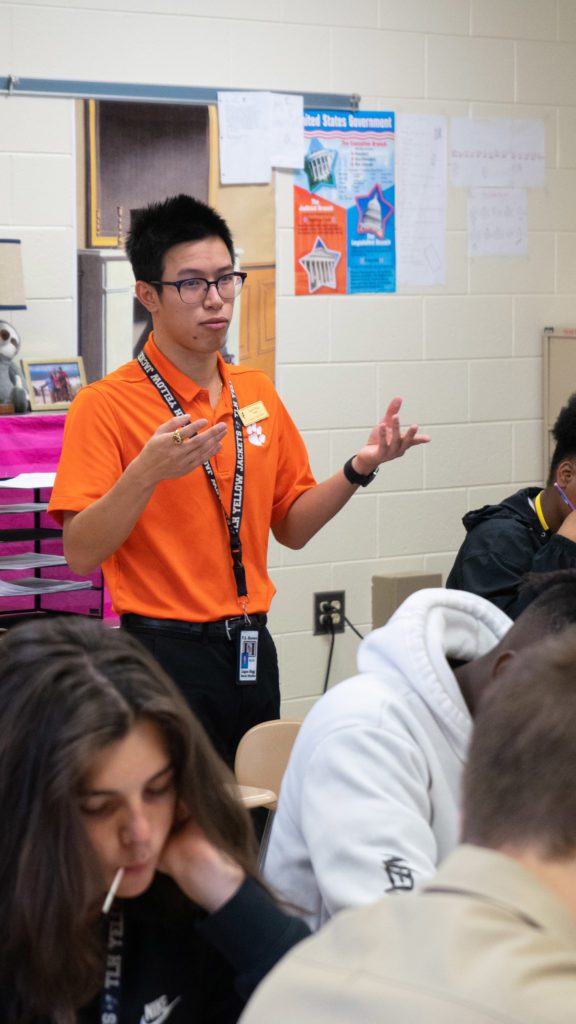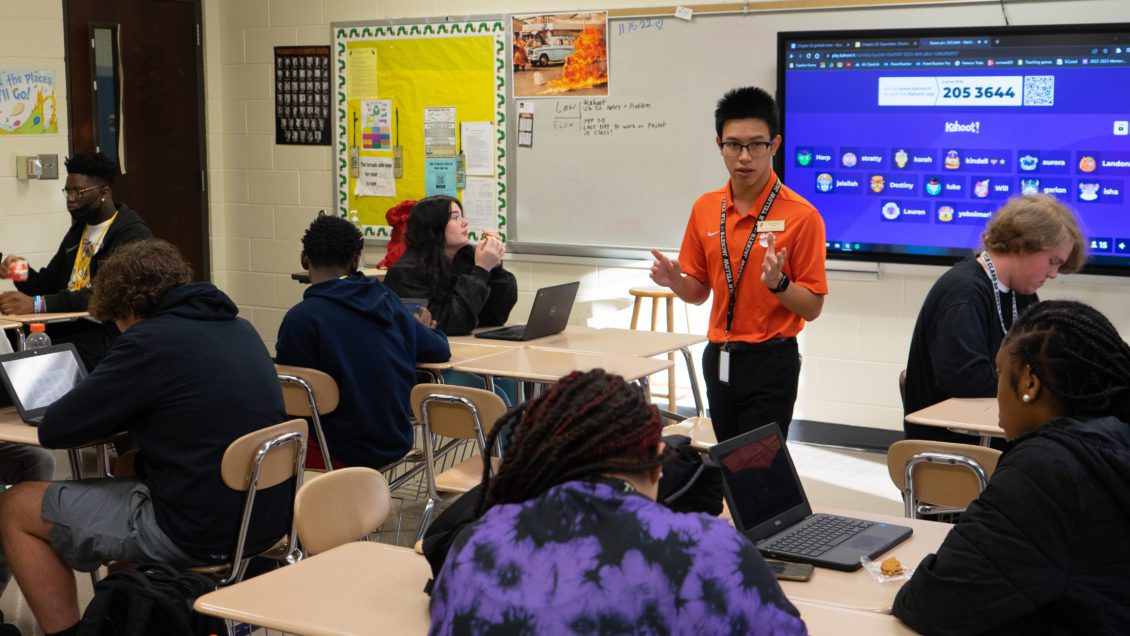It usually takes years for careers to come “full circle,” but Logan Hogg can already claim it. After earning a degree in secondary education with an emphasis in social studies from the Clemson University College of Education, Hogg returned to his high school alma mater, TL Hanna, to teach.
We recently met with Hogg to talk about returning to TL Hanna, what he took from his time at Clemson, and how he continues to use his profession to overcome a lifelong speech impediment.
What is it like to teach in a school you attended as a student?
I graduated in the class of 2017. I think it really helps out with the bond that I have with my kids to basically be able to tell them, “hey, I was in your shoes, I was able to do all these things, and I want to see you do better within the classroom setting.”
The weirdest part about my teaching here is that I can now call all of my old teachers by their first names. It was the weirdest transition by far to be able to call my old coach by his first name. But I love it.
Did you always want to be a teacher?
Throughout my high school career, I wanted to be a chef. But one teacher here, Ms. Rinker, inspired me to be a teacher, and now she is my mentor. She really laid the groundwork for how I can be the best teacher I can be and how I can be the best person I can be, whether that is inside or outside of the classroom.
She is the graduation coach here at Hanna, but when I had her, she taught U.S. history and U.S. Government/Economics. I chose to teach social studies because of her – and I’ve never been really that great at math. For me, it was really between science, English and social studies, and my heart was pulling me more toward social studies because I’m a big fan of psychology and sociology.
The great thing about social studies is it’s ever-changing. There’s new stuff happening in the world every single day. Maybe that’s what I really love about social studies, more so than English or science.

How do you make the content engaging for students?
I’m a big fan of informal and formal discussion time, group work, and group projects. I like when there is a product of learning that is tactile and physical, whether it is pamphlets, posters or brochures. I think that, especially for a first-year teacher like me, is the best and easiest way to make lessons more engaging and encourage student collaboration.
When you reflect on your time at Clemson, what stands out to you?
I really cherish just how friendly everybody was. Regardless of whether they were in the same majors or the same college, everyone was just so welcoming. One thing that I really took from Clemson that I try to implement in my classroom is the idea of a safe and inclusive environment. Every professor I had at Clemson really homed in on that idea. That happened in Clemson classrooms through my field placement supervisor during my placement at Pickens High School.
What practical lesson learned at Clemson do you find yourself already implementing in class?
The importance of the parent-teacher relationship. Parents can be a teacher’s best friend or worst enemy. It’s imperative to have those parents on your good side. One specific thing that I learned was to always start off an email or a phone call with a gloat, right? And then, after that, you can discuss areas where a student might improve or where they might need work or where they’re not showing their full potential.
I think that is one of the most important I’ve learned from Clemson has to do with mental health. If I come into my classroom all groggy or upset or reserved, that is going to rub off on my students because it will be clear I’m not having a good day. I think finding that drive to be the best that you can be each and every day is the biggest challenge for all first-year teachers.
Without a good mental health regimen, my class wouldn’t be a very fun or engaging environment or, more importantly, an environment in which learning is the top priority.

Teaching might seem to many like a challenging career choice for someone with a speech impediment. Did it give you pause when choosing your major?
The number one fear in America is public speaking, and I totally understand how it can be hard for someone like me with a stammer and a stutter to be a teacher. However, I always had the mindset that if I did it enough, I’d just get over it. Nowadays, I stutter and stammer with my classes whenever I get really excited about something. It’s an ongoing thing that I’m trying to figure out.
It’s been there since I learned how to talk; I don’t know if it’s genetic or what, and I’m not really going to worry about it, either. I think it is important for me to realize that it is going to happen, I am going to mess up, but I am not going to be defined by the stutter. I am going to be defined by the relationships that I have with faculty and staff and, more importantly, with my classes.
The students are going to see me every single day. I’ve had my fair share of comments, whether it be me as a student or already as a teacher, but I can’t let it phase me. If I do, it will eat at me whenever I’m out of the classroom. I’m a big believer that whenever I leave the doors of my school, I’m done for the day. Everything is past me. Whether it was a good day or a bad day, there’s going to be a brand-new day tomorrow. That’s it.
Get in touch and we will connect you with the author or another expert.
Or email us at news@clemson.edu

